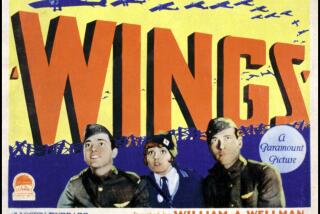Makeup artist Bill Corso works hard to keep it real in ‘Foxcatcher’
It’s a paradox of being a film makeup artist that one seeks to make the work invisible while also wanting it to be recognized. But when an actor seems to transform utterly, as Steve Carell does in portraying John du Pont, the peculiar and tragic multimillionaire at the center of “Foxcatcher,” how much of what persuades us can be attributed to the makeup artist’s skill?
Carell and makeup man Bill Corso, as they seek to draw attention to the movie, seem intent on deferring much of the credit to each other.
PHOTOS: Oscars 2015 top nominees | Presenters | Nominee reactions
“What you’re seeing is just amazing acting,” says Corso of the distinctive way Carell speaks, breathes and aligns his body in his portrayal of Du Pont, the real-life figure who established a training site for Olympic wrestling contenders at his Pennsylvania estate, Foxcatcher Farms. One can’t, then, trace these changes to the effect of the prosthetic nose — that haughty appendage from which Du Pont seems to look down on the world? That formidable beak that may well have inspired Du Pont’s self-given nickname, the Golden Eagle?
“There was no prosthetic — that’s just my nose,” says Carell, best known previously for lighter turns in such fare as “The 40-Year-Old Virgin,” television’s “The Office” and the Oscar-winning “Little Miss Sunshine.” “That’s how it looks if you photograph it in the right light.”
That’s actually half true. The altered part of Carell’s nose was the bridge, Corso explains, sculpted to prominence as “part of a prosthetic that changes the anatomy of Carell’s brow bone, his eyes and his profile.” The process, well-known to others in the trade, involves molding clay onto a plaster cast of the actor’s head, then casting the prosthetic from flexible silicon resembling human skin. Each day of the shoot, Corso glued the prosthetic onto Carell’s face and painted it by hand “to look like pale, translucent skin,” an effect that had to match the previous day’s work each time.
Director Bennett Miller (“Capote,” “Moneyball”), according to Corso, kept saying, “‘He’s got to look like a blueblood.’ That term [for old money Easterners] evolved because those guys don’t get any color. They’re so pale you can see their veins. At the same time, Bennett didn’t want anyone wearing makeup. He wanted it to look raw,” Corso says. “So it’s twice as much work because you’re constantly checking and adjusting throughout the day to maintain this high level of realism.”
FULL COVERAGE: Oscars 2015
As in real life, the events in “Foxcatcher” culminate in bizarre tragedy when Du Pont, who suffered from schizophrenia, fatally shoots Olympic champion Dave Schultz (Mark Ruffalo), whom he had enticed to live on his estate.
To remove Carell as far as possible from his natural mien (in person, Carell is instantly accessible, warm and, as he himself points out, “so youthful”), Corso began by “eliminating the things that make Steve who he is,” removing the actor’s vivid eyebrows, darkening his light brown eyes with contact lenses, shaving back his hairline and silvering his hair, and changing the shape of his teeth by inserting a thin dental veneer. “We aged his hands — anything to change him,” says Corso.
Did his changed appearance determine how disturbing his character could be? Not exactly. “More than my reflection in the mirror, it was the reflection I saw in other people’s eyes — how uncomfortable they became around me — that I took my cues from,” the actor says.
Carell says Corso, a previous Oscar winner for “Lemony Snicket’s A Series of Unfortunate Events,” was a “true collaborator. He had as much to do with developing this character as anyone.” But if the prosthetics affected his performance, Carrel says he wasn’t aware of it.
“You forget they’re there. I was never conscious of it,” he says. He studied videotapes of the real Du Pont promoting his various enterprises and charitable works. “It was the outtakes that gave me the most insight,” says Carell. “I wasn’t attempting an impersonation but trying to glean the truth of who he was.”
Normally a relentless critic of his own work, Corso experienced the premiere at the Cannes Film Festival, where Miller won the directing prize, as a revelation, in that his own contribution seemed to vanish before his eyes. “I got lost in it. And the way the audience reacted, they didn’t pick it apart and say, ‘Everyone’s in prosthetics.’ They saw a story, and characters. They liked it. They understood. That was really cool. It was like, in my dreams it would be received like this.”
More to Read
From the Oscars to the Emmys.
Get the Envelope newsletter for exclusive awards season coverage, behind-the-scenes stories from the Envelope podcast and columnist Glenn Whipp’s must-read analysis.
You may occasionally receive promotional content from the Los Angeles Times.






